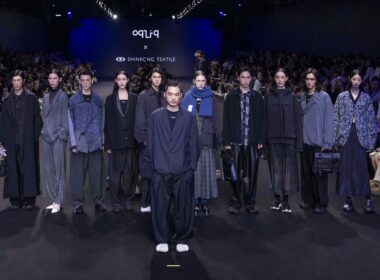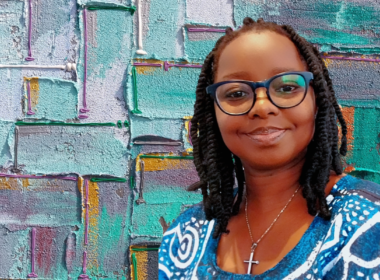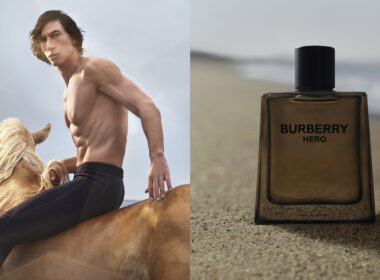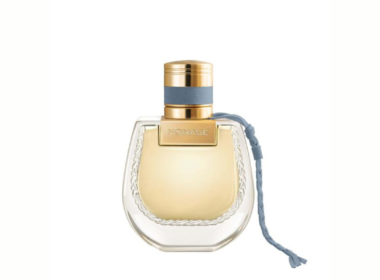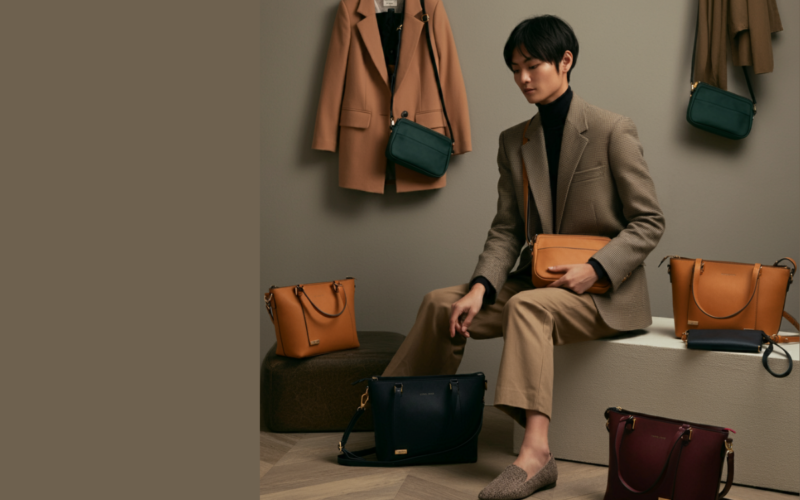Art has always been a mirror reflecting the complexities of society, culture, and personal evolution. Gerald Chukwuma is one of the few artists who can truly capture the essence of change in our world that is constantly shifting. For those unfamiliar with his work, Gerald Chukwuma’s art is about chronicling history, much of which is rooted in the legacy of the African diaspora and the perseverance of marginalized communities.
This exclusive, unfiltered interview offers an intimate look at the artist’s creative process, influences, and thoughts on the evolving role of African art on the global stage. In this conversation, we also explore Chukwuma’s take on the business of art in Nigeria, as well as his vision for the future of African contemporary art. Whether you’re a seasoned art lover or new to the world of visual storytelling, this interview is filled with insights, lessons, and reflections that highlight Chukwuma’s significance not only as an artist but also as a cultural historian.

Editor’s Note: This interview with Gerald Chukwuma is presented in its unfiltered form. We believe this raw, in-depth conversation captures his essence and also the evolving dynamics of the art world. While lengthy, it serves as an invaluable resource for those studying his work, his perspectives, and the broader implications of art in today’s society. We hope this piece inspires and informs future generations, offering a rare glimpse into the mind of one of Nigeria’s most celebrated artists.
Gerald Chukwuma: I am working on a new piece about the beachfront. What beaches used to represent for us has changed a lot. The sea used to be a place for washing, but now it’s become more of a recreational spot, like a restaurant or a meeting place. Originally, I planned to lie down on a mat for inspiration, but that mat now holds more cultural significance. It’s not just a mat—it’s a symbol of gathering, connection, even marriage. The beach has evolved into a space where families form, relationships develop, and meaningful moments happen. The mat has become a metaphor for union and partnership, something that grows over time.
When it comes to technique, I’ve mastered it over the years. If I don’t have an immediate vision or idea, but someone asked me to paint something like a guy dancing on a table, I could still execute it in two weeks. That’s because technique was the first thing I truly focused on and developed. It was never about the ideas first, though of course, I do have them. For me, technique was the foundation—the way you go from nothing to something. That was what initially drew me to art.
People often overthink creativity. It’s like brushing your teeth—you don’t sit around wondering, “How should I brush? Should I stand this way or that?” You just brush and go about your day. But now, it seems like people feel the need to analyze everything; “Is your toothbrush good enough? Are you using the right toothpaste? Is there a mirror in the bathroom?” People become so conscious of every little thing, even how they’re brushing, just in case there’s a camera watching them. It’s a strange shift, really.
FAB: Does that mean you’re of the school of thought that art can simply exist for art’s sake?
Gerald Chukwuma: Art can be anything. Art is life. Everything in existence has its own beauty, its own form of art. There’s nothing that’s been created that doesn’t contain some form of artistry. I believe art truly lies in the eye of the beholder. Can everything be called art? Yes. But is everything really art? Maybe not. However, we can still find art in almost anything.
Take, for example, your sense of fashion. It’s distinct, and as a creative, I can recognize the art in it. But not everyone sees it that way. Some people might find it too unconventional or proper. They might say, “Not everything can be art.” But I believe there’s an element of art in everything, whether people recognize it or not.
That being said, I firmly believe that art should be free. Unfortunately, like the analogy of brushing your teeth, art has become overly controlled and directed—often unconsciously. The moment you start forcing art into a specific mold, it loses some of its freedom and spontaneity.
And anyone who tells you they haven’t been influenced by this shift is either unaware or lying. It’s like living in a time of slavery and claiming you don’t think about it. Or living in Nigeria and saying you’re not affected by the cost of food or fuel, even if you’re wealthy. It still impacts you in some way. So, of course, art is affected by these external factors, and denying that is dishonest.
For me, the challenge is finding a way to navigate through these influences—understanding how to maintain authenticity while playing within the system. It’s a balancing act, and I believe some people try to deny the truth of that. But to me, it’s what I call a “confident conspiracy”—a lie we’ve convinced ourselves of.

FAB: Speaking of how art should be free, the first time I visited the Nike Art Gallery, I was surprised that there was no entry fee. No matter how you’re dressed, you can just walk in and enjoy the art. But then, think about places like the beach, where everything is ticketed. You have to pay for entry, for parking, for everything. It all feels so elitist, as though you have to wear certain clothes to fit in.
Gerald Chukwuma: Exactly! You feel like you have to look a certain way before you’re even considered an artist or allowed to participate. But I think it’s something you grow into. If you grow into it naturally, there’s nothing wrong with that. It’s a process, a kind of metamorphosis. You don’t just stop being a caterpillar before you become a butterfly—you go through the necessary stages.
The issue arises when you approach art or life with that elitist mentality from the start, when you believe you need to conform to some external standard right away. That’s where the problem lies. But if you’re evolving into it, that’s okay. It’s a natural process of change.
Take the beach, for example. Yesterday, I was at the beach, just relaxing and thinking, and what you’re saying really hit me. We used to go to the beach and just run around, enjoy the space freely. Now, simply getting to the beach can cost you ₦10,000! It’s become so commercialized, and it changes the whole experience.
FAB: Hmmmmmn.
Gerald Chukwuma: So, we’ve come to a point where we almost despise nature. It’s troubling, and for someone to tell me that things must be done a certain way—it makes you wonder if they even saw this coming. Five years ago, if you told me this would happen, I wouldn’t have believed it. Art is complex, and if we don’t discuss it, if we don’t start addressing these issues, it’s like the relationship between money and art. What’s painful is that many artists shy away from discussing money. And the ones who suffer are always the artists.
The gallery owners, the buyers, even the auctioneers—they aren’t the ones who bear the brunt. It’s still the artist who does. This is why I believe one of the biggest mistakes in the Nigerian education system is the lack of financial literacy courses for creatives. It’s a huge oversight. If you don’t understand money from the beginning, from your days in university, you end up struggling later on.
So, you graduate, start producing work, and feel like you’re on top of the world, but you have no financial knowledge. You don’t know how to manage your earnings or how to protect your art. It becomes a gamble. And without that knowledge, you can end up like Van Gogh, celebrated but struggling financially.

Gerald Chukwuma: Kelechi Amadi-Obi understood this concept long before many others did. I remember seeing his work in Abuja and thinking it was the best art I had ever encountered. I was still in school then. Later, I came to Lagos and discovered he had a studio in Ikeja. Years ago, while I was working on a program with the British Council called Talent is Not Enough, one of the case studies we used was Kelechi Amadi-Obi’s work. I even visited his studio. At that time, his wife was managing the administrative side of things, while he focused solely on the creative aspect. That balance is key.
FAB: So, there’s also the business model to consider.
Gerald Chukwuma: If you don’t have a business model, it will take a lot of luck, or perhaps the grace of God, to succeed. Let me explain. In the art industry, those who seem to be progressing — and I hesitate to say “successful” because success is relative — often come from other fields.
They bring experience from administration, consulting, or even street smarts. They’re not just focused on creating art; they want to be taken seriously as professionals. Some might have started as lawyers or consultants, but then pivoted to the arts, bringing with them a different mindset.
These individuals understand money, organization, and self-worth from the beginning. They know what they’re doing when it comes to business. On the other hand, some of us were driven by pure passion, fighting against the odds because we couldn’t resist the fire within us. That fire still burns, but it’s not enough on its own.
Here’s the thing: you don’t need that intense fire to succeed if you know what you’re doing from the start — especially when it comes to administration, financial management, or setting your prices. Without those skills, when your fire dims and turns to charcoal, it can easily be extinguished. But if you build yourself up with knowledge, your fire becomes more sustainable.
I believe there are two kinds of artists: the good artist and the true artist. While these two types are almost indistinguishable, there’s a subtle but crucial difference in how they approach their craft and their careers.
You don’t need that intense fire to succeed…
FAB: The good artist and the true artist…
Gerald Chukwuma: The difference is that the true artist simply cannot help but create art. Whether they have money or not, they will still do art. Whether they can sell their work for ₦100,000 or ₦1 million, it doesn’t matter to them. Their whole being is infused with art — their dress, their hair, their entire life. They are consumed by art, and they can’t stop, even if they wanted to.
Then, there’s the good artist, who can have the same passion and background, but with more structure. The good artist is able to organize their art, take breaks if necessary, and plan a comeback. They have the ability to step away for a couple of years and then bounce back because they understand the importance of balance and strategy.
For the true artist, discouragement is always a risk, and that’s where figures like Van Gogh come to mind. I recently returned from Europe, where I spent time exploring the works of artists like Van Gogh and Gustav Klimt. I visited Van Gogh’s museum again, this time with a more mature perspective, and studied his pieces. His works are undeniably sad, gloomy, and small in scale. I had known that before, but this time, I viewed them with an open mind. Van Gogh wasn’t a happy man.
It’s like understanding why a bridge collapsed and then building another one the same way, 20 years later. People expect that from artists — they expect the same pain and struggle to produce great art. But it’s frustrating. As an artist, you cannot approach a new work with the same principles or materials that led to failure. Even if you’re building a bridge, you have to rethink the entire process and innovate. That’s what people fail to understand.
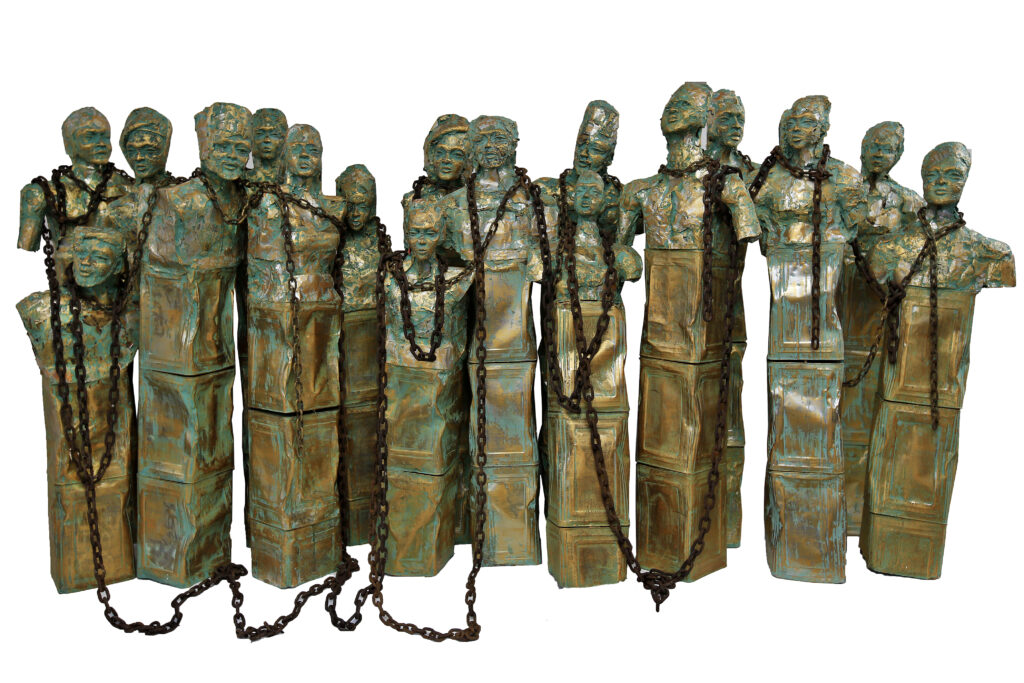
FAB: Because something is fundamentally wrong…
Gerald Chukwuma: Absolutely, something is wrong. When you reach this point, you need to figure out how to adapt. The problem is that people assume things should remain the same — like believing that a typewriter should still be in use when I have grandchildren. That kind of thinking is outdated, and it’s what made IBM obsolete. The same mindset can render any artist obsolete as well. Forget the stories and excuses.
We get caught up in the accessories of the past. Because we don’t confront these issues, they begin to feel normal. The digital age has arrived — let’s not just call it digital art, but the digital world. It’s here to stay. Yet, you’ll still hear people talking about “digitally aided art” as if that somehow diminishes its value. Come on! People are going to the moon. Why not make the moon a canvas for creativity? Do something imaginative with it.
If you’re a true creative, don’t suppress innovation just because you believe creativity must stay within traditional boundaries. That’s absurd! Look, back in the day, we killed animals because we didn’t have refrigeration. That was necessary at the time. But it would be foolish to stick with that method now, with modern refrigeration available. It’s that same technology that allows me to take garri to my grandfather in London so he can still enjoy it.
We have to evolve, but instead, we keep hiding from progress.
If you’re a true creative, don’t suppress innovation…
FAB: Speaking of hiding, this financial literacy issue you just touched on is pervasive across the entire creative space in Africa, not just in Nigeria. It affects fashion designers, actors—everyone. One thing I realized while I was there is that you can be incredibly talented, but talent alone isn’t enough in this industry. You’ll often see people who studied law, for example, approach their work with a certain hunger because they feel the need to prove themselves.
Gerald Chukwuma: Is it just about proving themselves? No, it’s more than that. They understand structure. They have a structured way of thinking.

FAB: Exactly. They think, “For me to achieve this, I need to follow a certain process, take specific steps.” But for us, as artists, we tend to think, “I’m good at what I do, and that’s enough.”
Gerald Chukwuma: What we used to call “proving ourselves” was really just trying to gratify our own egos as artists. And while that’s part of it, I don’t entirely agree with that mindset. You know why? We often say someone succeeded because they were trying to prove themselves, but that’s only part of the story. The other part is that they actually knew what to do outside the studio, beyond just their artistic talent.
FAB: Exactly.
Gerald Chukwuma: By default, many of us are only comfortable in our studios. Once we step outside, we feel lost, so we rush back to the safety of our creative spaces.
Stay tuned for Part 2, where Gerald opens up about his creative journey, how he handles setbacks, and why artists need to diversify to thrive.
